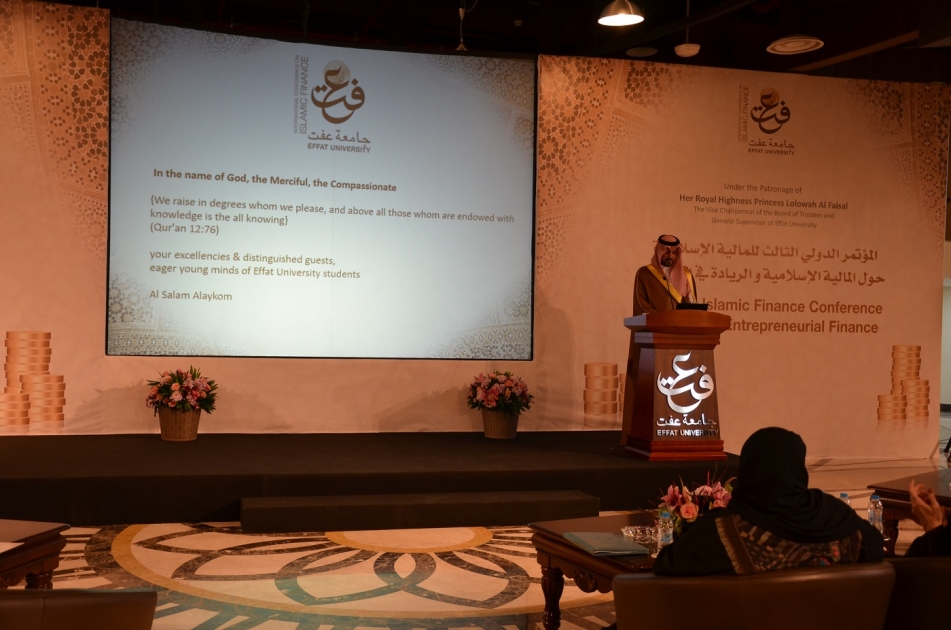
Academic and financial leaders discuss Shariah Compliant Entrepreneurship at 3rd Islamic Finance Conference hosted by Effat University
Effat University, the first non-profit private institution of higher education for women in Saudi Arabia, hosted the 3rd Islamic Finance Conference (IFC) held on Thursday 21 December 2017.
“The subject of this year’s conference Islamic Entrepreneurial Finance was selected because of its timeliness in the current economic environment of the Middle East, said Dr. Haifa Jamal Al-Lail, President of Effat University.
“This especially applies to the Kingdom of Saudi Arabia where a wide diversity of entrepreneurial SME ventures are needed to make up the largest percentage of new sources of revenue in order to achieve a successful outcome of the National Transformation Program and Vision 2030.”
With Dr. Samar Khan, Dean of Effat College of Business acting as MC, the conference commenced with Session 1 chaired by Dr. Maha Alandajani, Vice Dean, Islamic Institute KAAU, which consisted of papers and discussions of entrepreneurship in the Kingdom.
Paper 1 titled Islamic Entrepreneurial Financing & its Risk Factors: What Takaful May Contribute? was presented by Mohd Ma'Sum Billah, PhD - IEI – KAAU. He was followed by Dr. Faisal M. Atbani - IEI – KAAU whose paper was titled Entrepreneurial Enterprise in Saudi Arabia Analyzing its Legal Phenomena and Possible Recommendations. Paper 3 titled Encouraging Social Entrepreneurship in Saudi Arabia through 'Waqf' was presented by Dr Yusuf Abdul-Jobbar of Madinah Islamic University.
He was followed by Francine Pickup, and Irfan Syauqi – both Assistants to the Country Director- United Nations Development Programme – Indonesia - who presented Paper 4 titled Role of Zakat and other forms of Islamic finance in Poverty Alleviation. Session concluded with Paper 5 titled The guidelines to Adhara by Islamic Banks in Case of Default from a Shariah Perspective presented by Dr Alshath Muneeza – Maldives.
Next on the agenda was the Conference Welcome Address delivered by Dr Malak AlNory, Provost, Effat University. This was followed by the signing of a Memorandum of Understanding by Effat University and CIBAFD in the presence of Dr Turkhan Ali Abdul Manap, Senior Research Economist, Islamic Development Bank Group, and His Highness Prince Saud Bin Khaled Bin Abdullah Al-Saud, Co-Founder and Board Member of CBX Unit LLC, N.L.
The conference resumed with Session 2 Legal Issues in Islamic banking and Finance chaired by Dr Seita M. Almandeel, Vice Dean College of Law KAAU. Paper 6 titled The Impact of Islamic Governance Mechanisms 0n Corporate Governance Compliance was presented by Dr Muhammad Yar – Pakistan, followed by Paper 7 titled Shariah and Legal Dimensions of Post Default Sukuk Restructuring - a Critical Analysis presented by Dr Abu Umar Faruq Ahmed – Brunei.
Paper 8 titled A Systematic Synthesis of the Islamic Social Finance Frame
for Sustainable Islamic Social Enterprise was presented by Dr Ibrahimn Obiodun Oladape – Accounting Research Institute, Universiti Teknologi MARA (UiTM), Malaysia. Dr Zola Khan – Bahria University, Islamabad, Pakistan, presented Paper 9 titled Determinants of Capital Structure of Islamic and Conventional Commercial Banks: Evidence from Pakistan.
Session 2 closed with Paper 10 titled Determination of Islamic Banking Adoption in Pakistan: Empirical Analysis presented by Dr Syeda Faiza Urooj, Assistant Professor, Federal Urdu University of Science and Technology, Islamabad, Pakistan.
The conference continued with Session 3 titled Role of Islamic banks and IT In Islamic Entrepreneurship chaired by Dr Taher Tayachi, Chair of Finance Department, Effat University. Paper 11 titled CBX Unit: Grains Backed Universal Payment System was presented by Rama Muhammad, Effat University, followed by Paper 12 titled Comparative Efficiency Analysis of Conventional and Islamic Insurance Companies in MENA Region presented by Rasha Obaid and Dr Rozina Shaheen, Effat University.
Paper 13 presented by Dr Omar Kittenah, Effat University was titled Estimating the Income Distribution of some Islamic Countries Based on Entropy Measures, and the sessions concluded with Paper 14 titled Islamic Entrepreneurship: A Modern Mechanism for Financial Stability presented by Dr Umar Idriss, Effat University.
Now in its third edition, this year’s conference is focused on the pressing urgency for the Islamic finance sector to meet the need for Shariah compliant financial services, particularly among micro, small and medium-sized enterprises (MSMEs), by providing the platform to explore alternative infrastructure, products, and other facilities and possible venture opportunities for entrepreneurs.
The IFC 2017 was supported by the Islamic Economics Institute at King Abdulaziz University and the one-day event attracted a large number of potential entrepreneurs, distinguished scholars, academicians and researchers from esteemed organization, and doctorate students.
Established in 1999 as the first non-profit educational institute specialized in offering higher education for girls in the Kingdom of Saudi Arabia, Effat University today is renowned as a center of excellence where researchers from different fields collaborate in building and expanding the knowledge base to add future value to the Kingdom of Saudi Arabia.


























